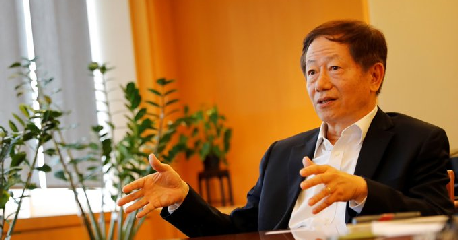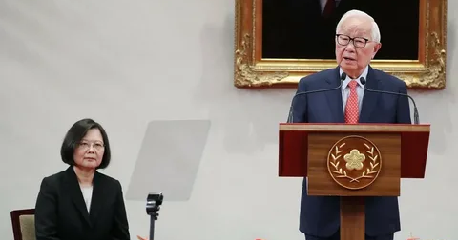
Liu Deyin, chairman of TSMC, a global leader in the design and manufacture of semiconductor chips, said on October 19 that tensions between the two sides of the Taiwan Strait and between China and the United States have brought "more severe" challenges to the semiconductor industry.
"The epidemic has been spreading for almost three years, and the Sino-US trade war and geopolitical conflicts (Russian-Ukrainian war and cross-strait tensions) have continued to escalate, deepening the impact on the global semiconductor industry supply chain, and the challenges faced are more severe than before," TSMC said. Chairman Liu Deyin said Wednesday in a speech at the annual meeting of the Taiwan Semiconductor Industry Association.
Liu Deyin, who also serves as the chairman of the Taiwan Semiconductor Industry Association, did not directly comment on the recent expansion of U.S. export controls on Chinese chips, but he said, "To develop semiconductors well, everyone should rest assured."
Liu Deyin also said that the Chinese government's promotion of the semiconductor industry has never stopped in recent years, including strong support for local players in the semiconductor design, manufacturing, packaging industry, as well as in the market for talents, taxes, capital, equipment and domestic demand. He also said that the U.S. government has also passed the Chip Technology Act to vigorously support U.S. local R&D and manufacturing.
"The competition, cooperation and growth of the global semiconductor industry are already underway. We expect Taiwan's industry, government and academia to put forward more constructive measures in terms of semiconductor industry innovation and R&D, talent cultivation, talent retention, intellectual property protection and other related industrial policies to safeguard Taiwan. The most critical semiconductor industry advantage," Liu Deyin said.
Semiconductor chips are used in everything from cars to smartphones to data centers to fighter jets. Taiwan is the center of the global semiconductor chip industry, and TSMC is the world's largest chip foundry group and the company with the highest market value among listed companies in Asia.
The global semiconductor chip industry is currently experiencing some extremely serious challenges. On the one hand, the new crown epidemic has hit the supply chain, causing serious shortages, including automotive chips. On the other hand, global inflation is forcing governments and companies to cut back on spending, a move that could reduce demand for semiconductor chips. Sandwiched between China, its largest export market, and the United States, its most staunch international supporter and arms supplier, Taiwan is in a more delicate and difficult situation, especially when Beijing has gradually increased its military pressure and intimidation on Taiwan in order to force cross-strait reunification. Time.
Huang Chongren, chairman of another well-known Taiwanese semiconductor maker, Power Semiconductor Corp., expressed concern about the difficulties the U.S. may have caused by tightening export controls on Chinese chips to Taiwanese manufacturers.
"We have business on both sides of the strait. So we can't listen to the US and don't do business with mainland China. What do people eat if they don't do business?" Huang Chongren said. "Our industry's position is to maintain our competitiveness."
When talking about the sustainable development of Taiwan's semiconductor industry, Liu Deyin specifically called on the Taiwan government to formulate specific long-term water, electricity, land, and environmental policies, and formulate forward-looking and feasible environmental regulations, "to promote the industry to achieve the goal of sustainable development."
When talking about the external environment, Liu Deyin said that the US-China trade conflict and the escalation of cross-strait tensions have brought more severe challenges to all industries, including the semiconductor industry. However, Liu Deyin is pleased with the new development of Taiwan's semiconductor industry in the past year.
"In the past year, Taiwan's semiconductor industry has still achieved splendid results of 'manufacturing first, packaging and testing first, and IC design second' in the industry chain," he said.
According to statistics from the Taiwan Semiconductor Industry Association, the total output value of Taiwan's semiconductor industry in 2021 has exceeded NT$4 trillion (about 124.8 billion US dollars), and it is expected that the output value of Taiwan's semiconductor industry will reach NT$4.88 trillion in 2022, an increase over 2021. 19.7%.
Liu Deyin said that facing the challenges and opportunities of today's semiconductor industry, he expects all members of the Taiwan Semiconductor Industry Association to work together to continue to gain a competitive advantage for Taiwan's semiconductor industry in the ever-changing international environment.

